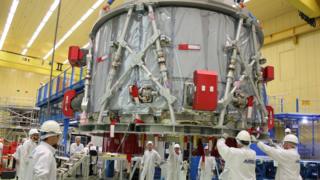
[ad_1]

Image copyright
AIRBUS
The European Service Module pushes the Orion capsule through space
European industry has handed over a key part of the spaceship infrastructure that will take humans beyond Earth and into the wider Solar System.
At a ceremony at Bremen airport in Germany, American officials accepted the first service module that will power an Orion capsule.
Orion is the next-generation vehicle that the US is developing to carry astronauts to the Moon and on to Mars.
A first flight of the trans-Atlantic spaceship combo is scheduled for 2020.
Image copyright
NASA
Artwork: Exploration Mission-1 will go around the Moon in 2020
Known as Exploration Mission-1 (EM-1), it will be an uncrewed demonstration outing. Astronauts are expected to climb aboard a second flight a couple of years later.
Friday’s ceremony marked a significant milestone in the US-European collaboration.
This is the first time America has gone outside its shores for such an important piece of human spaceflight hardware.
The European Service Module (ESM) is essentially Orion’s back end. It will provide propulsion, an electricity supply, thermal control, and all the gases and water needed to sustain any humans riding inside the capsule.
Fully loaded, an ESM will weigh 13 tonnes. Most of that will be fuel to drive the module’s main engine and its 32 smaller thrusters.
Bremen is home to a major manufacturing facility for European aerospace company Airbus.
The firm has led the construction of the ESM over the past four years under contract to the European Space Agency. Esa formally passed the hardware on to its American counterpart, Nasa, at the German airport.
Image copyright
NASA
Artwork: Orion and its service module will launch atop a new rocket
On Monday, an Antonov cargo aircraft will ship the ESM to Nasa’s Kennedy Space Center in Florida. It is there that the service module and Orion will be mated. An extensive series of testing is then planned ahead of the June 2020 mission.
That flight will see the combo travel 64,000km beyond the Moon in order to demonstrate system capabilities and their readiness to support astronauts on EM-2.
Because the service module is an expendable component (it is dumped prior to Orion’s return to Earth), a second ESM will be required for the later flight.
This unit is already under construction at Airbus in Bremen, and some long-lead items needed for EM-3 are also being procured. The US-European relationship on Orion is intended to be a long-term one.
[email protected] and follow me on Twitter: @BBCAmos
[ad_2]
Source link